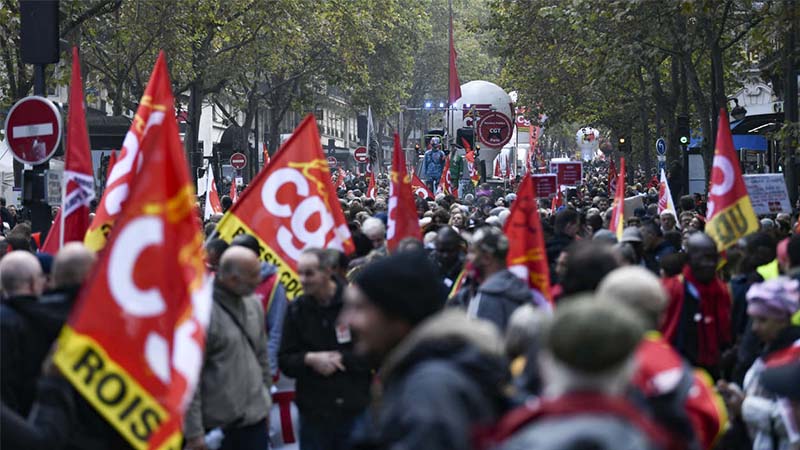
More than two million demonstrators throughout France, 400,000 in Paris, more than 100,000 in Marseille, 50,000 in Nantes and Toulouse, high follow-up to the strike in both the public and private sectors: the day of mobilization on January 19 impressed for its massiveness. After this great success, the inter-union called that same night for “the entire population to mobilize even more massively on January 31 to say no to this unjust reform.”
On January 31, the path to follow is clear: the mobilization must continue and expand, seeking to express anger against the pension reform through strikes and in the streets. Various polls show that this reform is unpopular. Mobilization has also started in many universities, where general assemblies and mobilization committees were organized this week against Macron’s reform.
In view of the demonstrations on January 31, the French government announced the deployment of 11,000 police and gendarmes, including 4,000 in Paris. A large-scale security device, while the day of the 19th was marked by strong police violence, with a protester who had to have a testicle amputated.
It is important that the day of this Tuesday is very massive. In addition, this Tuesday should also be the opportunity to raise the question of how to continue this fight and what is the battle plan to win. That is what was raised by nearly 200 union representatives -from a large number of sectors, from petrochemicals to health, including transportation, aeronautics, the automobile industry, education and cleaning- along with intellectuals and activists from different sectors in an open forum published by the media The Sunday newspaper The last Sunday. In particular, they argue that we must take as an example the fight plan of the refineries, which have announced a series of staggered strikes. In this way, it could “prepare a January 31 even stronger than January 19, which marks the beginning of a generalized renewable strike dynamic to tear down the reform and impose a great defeat on Macron.” An orientation that is not the one that the union leaders have, who have only called for isolated dates of mobilizations, without wanting to go beyond controlled pressure.
The inter-union bets on a strategy of pressure, a battle plan must be discussed
The inter-union continues to bet on a strategy of pressure, even according to some leaks, the union bureaucracy has planned to call the next mobilization date… a Saturday. A proposal that, if materialized, would express this logic of the inter-union, to mobilize without “bothering” anyone much.
From the union bureaucracies they consider that the days of mobilization on isolated dates will make it possible to widely mobilize and maintain support for the movement. And they assume that, given the massive rejection of the law, the government will end up “come to its senses.” In this context, they seek to avoid going towards harsher measures. This idea seems to predominate, even on the side of the CGT leadership and Philippe Martinez. Until now, the CGT has not launched any initiative to coordinate the different sectors in the fight towards a renewable strike. And the only sector that has joined the refinery strike is the CGT Energía.
However, the government believes that the reform “is not negotiable” and Macron remains determined to approve it, since a large part of his political credibility is at stake here. That is why he wants to approve this reform as soon as possible.
To prevent Macron from approving the reform, this January 31 must be a point of support to democratically discuss the battle plan for the coming weeks. The fact that unions from strategic sectors such as petrochemicals, energy, railways or education have raised the question of the renewable strike is a central point, on which all workers must rely.
In this sense, working for a generalized and renewable strike can only go hand in hand with the development of General Assemblies in places of work and study. This January 31st is a good occasion to organize General Assemblies wherever possible, to anchor the movement at the base and strengthen the activity of strikers, unionized and non-unionized.
The development of self-organization would be a key tool to link all the strikers and mobilize them to build and expand the strike from the bases, promoting strike funds to prolong the mobilization and calling on the workers of subcontractors or nearby companies to join the The struggle.
Such actions must go hand in hand with the construction of interprofessional coordination assemblies that link the different companies from the base. These general assemblies could be the place for drawing up a list of demands that goes beyond the simple rejection of the reform, proposing, for example, the need to link the current struggle to that of wages.
The refineries call a 72-hour strike from February 6, and the CGT and SUD Rail workers call a strike on February 7 and 8. This calendar of strikes could allow progress with self-organization and coordination.
All these elements must be at the center of the debates on January 31, so that this new stage of the struggle is not only massive, but also allows the foundations of a combative and renewable general strike to be built.
Spanish version of an article by Paul Morao published in French in Révolution Permanente.
Source: www.laizquierdadiario.com

